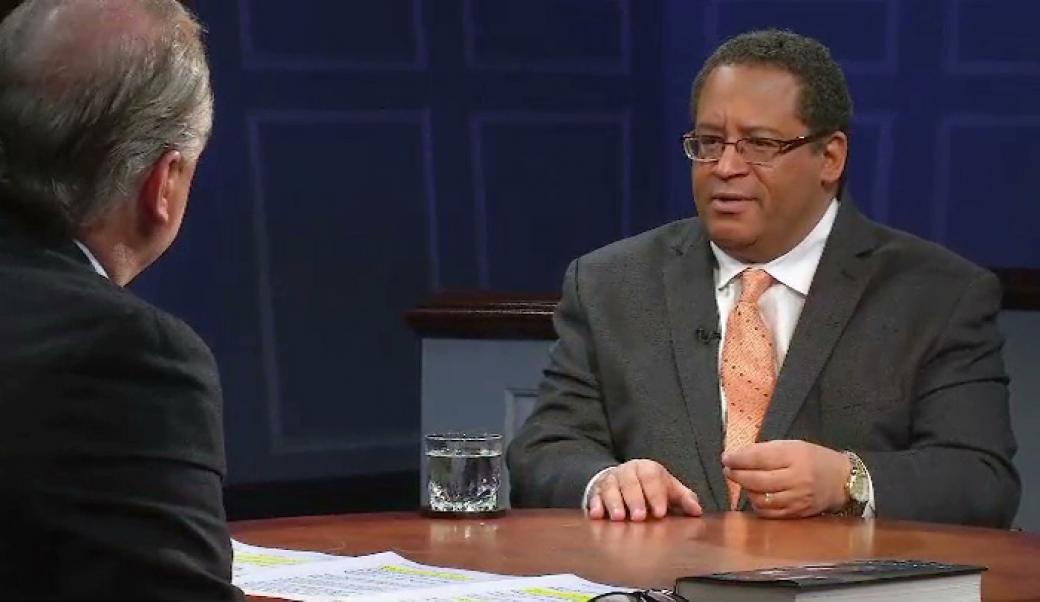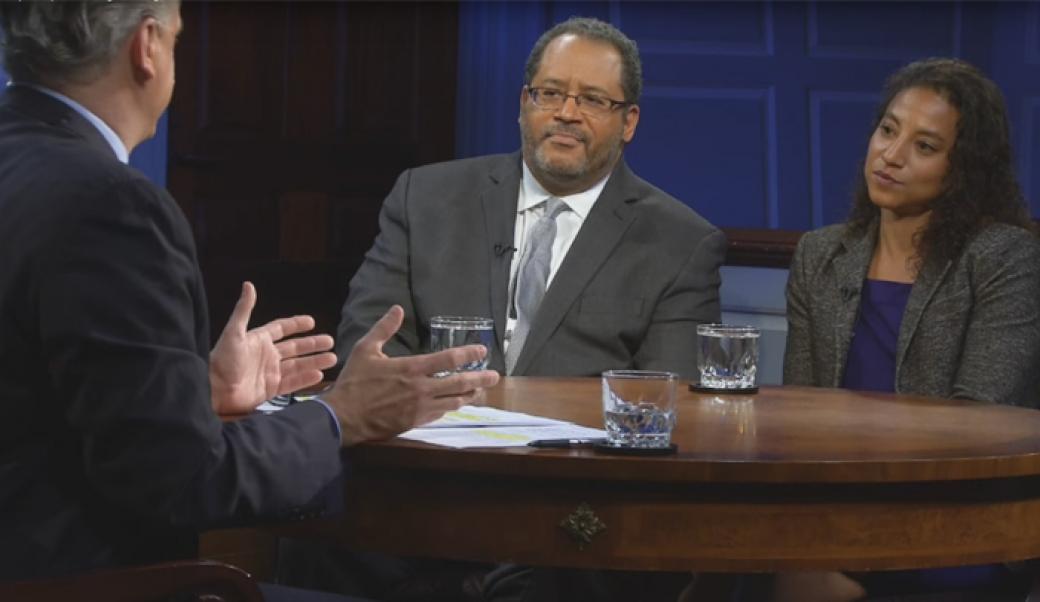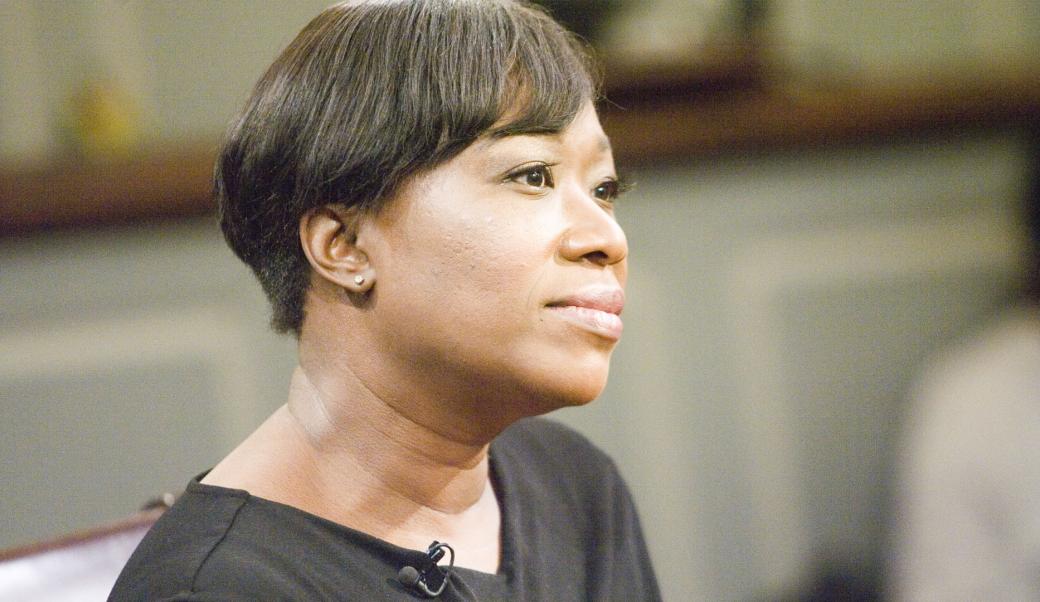About this episode
September 30, 2016
Peter Onuf and Annette Gordon-Reed
In this episode we examine all of Thomas Jefferson with two of America’s most esteemed Jefferson scholars. Annette Gordon-Reed and Peter Onuf have written a total of at least 18 major works on the third U.S. president. Peter Onuf is an emeritus professor of history at the University of Virginia. Annette Gordon-Reed is a professor of law at Harvard University and a winner of the Pulitzer Prize and the National Book Award. They have jointly published a new book, "Most Blessed of the Patriarchs: Thomas Jefferson and the Empire of the Imagination."
Transcript
Douglas Blackmon: Welcome back to American Forum. It has been 240 years since the American Declaration of Independence was written, largely, by Thomas Jefferson, who without doubt, and even in spite of the popularity of the Broadway musical about Alexander Hamilton, remains the most remembered, and probably, most beloved, of our nation’s founding fathers. Jefferson’s Age of Enlightenment ideals still shape our national values, and his life as a politician still informs us in modern times. He won election to the presidency in 1800 after one of the most brutally negative campaigns in American history. Not unlike 2016, that election was a culmination of a larger struggle between two starkly different visions for America’s political organization and the losers were largely obliterated by Jefferson’s victory. Two hundred sixteen years later, we could witness a similar transformative moment. Though, obviously, the choices this year aren’t exactly Thomas Jefferson or John Adams. As adored as Jefferson has long been, he is also difficult to understand. Even harder to love. He provided the philosophical backbone of equality, that powered our great revolutionary experiment in democracy. He was a believer in the power and value of the people, not just the rich. But he also feared the rabble, and wanted the pleasures of great wealth. He believed in the power of government, but feared too much of it. He was generous to the people he loved, and yet he enslaved, as a personal concubine, the mother of most of his own children. He believed slavery was immoral and could ultimately destroy the Republic. Yet Jefferson did little to bring it to an end, and allowed the great majority of the victims of his slaving enterprises to be sold on the auction block.
FACTOID: The Question: How should Thomas Jefferson be remembered?
Our guests today are two of America’s most esteemed scholars of Jefferson. Annette Gordon-Reed and Peter Onuf have written a total of at least 18 major works on the third U.S. president. Peter is an emeritus professor of history at the University of Virginia. Annette is a professor of law at Harvard University, and a winner of the Pulitzer Prize and the National Book Award. They have now jointly published a new book that explores deep within the magnificent and contradictory mind of Thomas Jefferson. It’s titled Most Blessed of the Patriarchs Thomas Jefferson and the Empire of the Imagination. Thank you both for being here.
Blackmon: So there’s something at least superficially ironic for me about the book in that both of you, but particularly Annette, over the past two decades have been associated with first this reconsideration of Jefferson that raised many doubts about Jefferson; that cracks the idea of him as the most perfect of the founding fathers, but now this book while it’s significantly about the slavery question, and we’ll talk more about that later, but it is also seemingly a call to recognize the other Jefferson. In some sense to restore the Jefferson that we thought we knew before so much of this more recent discussion and I think that’s what “The Empire Imagination” in the title is really getting about. But what exactly do you mean by that, “The Empire of the Imagination”?
Peter Onuf: Me?
Annette Gordon-Reed: Yes, you.
Onuf: Oh ok. (laughter) Well Doug, I think the idea is that Jefferson looked forward. In fact, if you wanted to say one thing that differentiates Jefferson from our times, makes him a foreigner, his sensibilities somewhat alien. You mentioned before how Enlightenment (for the era) ideas still shape our values, but there’s one fundamental premise of the Enlightenment (for the era), which is a belief in the possibility of progress that I think we don’t embrace with the same fervor. The whole idea of enlightenment suggests that it’s cumulative; that more light will be shed, more people will see clearly. And that’s what we’ve premised our whole experiment on is that if you engage the people in politics they take it as their own they don’t simply submit to superior authority; then they will become more enlightened and have a better kind of politics that’s truer to who we are. That’s Jefferson’s dream.
Gordon-Reed: Yeah, and he was optimistic. I think that’s what you’re getting at. He had a sense of optimism because he’s in the Age of Enlightenment, the age of scientific discovery.
FACTOID: The European Enlightenment spanned from 1685-1815
And he saw so much of life, likened it to science in a way, that science would progress and human beings would progress. So the empire of his imagination is all the things that he sort of thought were possible, that could happen with the new republic, with a new nation. That we could do things differently. And so the empire of his imagination is Jefferson up at Monticello and various venues thinking about what the future will be like and what would make a good future. And so, thinking that things were going to work out and that’s the thing that as Peter is saying is difficult for us to understand, because you know we see what happened, right? And then we understand all the struggle the turmoil and so forth, but he was confident that things would get better and better and better and I don’t think we realize that it doesn’t progress in that sort of linear fashion. And I think he really did see that or think that people go to school, people become educated, the larger masses of people, then enlightenment would come.
Blackmon: Yeah and I think that one of the really important contributions of a book like this in a conversation like this is this reattachment of the genius to the villain if you wanted to use extreme terms.
FACTOID: Jefferson was chosen to draft 1776 Declaration of Independence
Because, when we focus on only one or the other, we distort whichever side we’re paying attention to. And the villainy of his involvement with slavery is not particularly unique. I think we now understand pretty clearly, certainly not even unique among the founding fathers most likely. We happen to know more about Jefferson for a variety of reasons. You guys also make the very interesting observation at the very beginning of the book that we actually know a lot about Jefferson today that we didn’t have the ability to know 20 or 30 years ago. And the way that you’re able to bring a more nuanced understanding of the communication that he was having with his relatives and the world that’s surrounded him; you’re able to place both his genius and these less welcome dimensions into a context that is about all of us in a way. He’s troubled by dimensions of slavery, but also struggles to find ways that, where slavery can coexist with this natural order.
Onuf: Well, he has to.
Gordon-Reed: Well, he has to, and, and in France, he is there with James and Sally Hemings, and even before he gets there, because of the nature of his family life, his wife’s half siblings that she brings, allows to bring, brings to Monticello.
FACTOID Thomas Jefferson was the father of six children with Sally Hemings
He sees slavery through his relationships with them, the people who are around him. And his relationship with those people are very, very different than people down the mountain, and certainly in France, James Hemings and Sally Hemings are existing in a sort of quasi state of freedom. All they, they had to, all they had to do was to petition for their freedom and it would have been granted. Everybody who did that in the 18th century was granted, 18th-century Paris it was granted, so they could have.
FACTOID: France abolished slavery in 1794, over 70 years before the U.S.
And so he, and he pays them wages while they are there. It is sort of a strange, it’s difficult for us to wrap our minds around, but he, for him, its slavery and family all wrapped together and it’s something that allows, I, we think, we argue, allows him to make his peace with the institution. Before he goes over, he is a person who has been vocal about slavery and against slavery. And when he comes back, um, he is less vocal. In fact, most of his statements about slavery, I think pretty much all the things he has to say, are in response to people’s queries. He’s not writing to people proactively, and saying, “you know what I think?” No, people are writing to him, and he writes back. He just sort of retreats on that point, he becomes…
Blackmon: After having once, after having once introduced legislation to, gradually eliminate slavery in Virginia in an earlier point.
FACTOID: 1785 Jefferson proposed a plan of gradual emancipation
Onuf: Well, he says I’ve already made my position clear and its getting hackney, I don’t wanna repeat it again, it’s up to you, American public, to do something about it.
Gordon-Reed: And he, and he’s doing the other things that you know really matter to him and that’s again the new republic
Onuf: I think that point about domesticating slavery is really important and one of the things that masters demand from their enslaved people is a denial that their mastery is despotic. That is, we expect, if I own you Doug, I expect you to smile. If you’re really a slave, don’t make eye contact with me. Act in a certain way that performs gratitude. And I think this kind of delusional idea that slavery works for masters and slaves it becomes proslavery paternalism comes out of this kind of necessary day to day accommodation with a lived reality
Gordon-Reed: And certainly becomes even more so when you have a group of people who you are related to in some capacity, your wife is related to and you’re not, they’re really not like the people down the mountain. He may not make them smile, he may not make them smile at him, he may tolerate, he may tolerate and does tolerate things from them that he wouldn’t from people down the mountain. And that, just think about the insidious nature of that when you are in the system and the delusion, the delusion is that well, were all a family here. We’re all, this is some natural thing that is going on. I have shirts made for James, I give James spending money, I let James and Martin and all these people run around. I don’t know where they are a good part of the time. They hire themselves out, keep their wages. You do those kinds of things, you come, that’s how he, that becomes the face of slavery for him. But there are people down the mountain who, none of that stuff has, none of that’s happened to…
Onuf: A lot of it’s very abstract. His notions of how he is looking out for their happiness. There are a couple of words that we don’t associate with slavery that really need to be brought into our vocabulary. One is a kind of reciprocity. That’s hard to, to swallow because it’s obviously not equality, it’s asymmetrical. Its reciprocity from different positions and then there’s also as you were talking about, the word trust comes to mind, that these are human beings you trust. So we think that, that’s the perversion of distortion of everything we believe in. But it, it normalizes and domesticates the institution. Jefferson knows its unjust, something has to happen, but it can’t happen just because he says it has to happen.
FACTOID: 1778: Jefferson drafts Virginia law against import of African slaves
Gordon-Reed: And it’s a weird system. I was just at a workshop several weeks ago, about polygamy, now we get to this. And Jefferson is living at Monticello with, you know, Sally Hemings, her sisters, Elizabeth Hemings, his daughters, at some point and this world where he is this patriarch. It’s a world of women, essentially, who are directing his life. And so this is a very comfortable at every level. This is a comfortable place for him.
FACTOID: Jefferson began building Monticello, his primary plantation, at age 26
Blackmon: Well, and this speaks to something that I’ve long thought and written about a few times, but this notion that the seeming contradiction between all men are created equal and the institution of slavery and the sexism and all, all the other obvious violations of that notion of equality. Ah, the explanation for that, to me, has always been that the founders, and certainly Jefferson, weren’t necessarily suggesting the idea that all men or all humans were equal, but instead, that that what we were doing in our democracy was extending royalty to all men. Essentially that sort of privileged status of, of royalty in Europe and the ability of royalty to speak directly to God and to have a different kind of relationship with the church. We’re extending that out to all men, not bringing in these, these non-men.
Onuf: All men, of all nations one day, that’s the Republican-Democratic millennium. So he sincerely believes that if and that’s suggesting if that enslaved people could be emancipated, and expatriated, then in this world of nations that are homogenous, they are like families after all.
Gordon-Reed: And through trade, and calamity, those kinds of things, then you could have a relationship.
Blackmon: But if you extend royalty to all men, royalty can only exist if some are not royal. And so but baked, in the notion that freedom, freedom for all men demands the absence of freedom for other people in that construction of freedom.
Onuf: In the family, you’re right, but if the resources that support what you’re calling Democratic royalty, this idea that every man can have his own estate, well if the resource for that is a, an undeveloped continent with land for the thousands to the thousands generations as he says in his inaugural address. Why can’t every man have what only the aristocrats who, how many people own the city of London, even today, Doug? I mean that idea that only a few will own the land. That’s the way the old regime was constructed.
Blackmon: Talk a minute about the, so you also explore faith, and that’s an interesting area around Jefferson in which a lot of us think we know something but there, understand things, that I think you bring up some new subtleties to some of that discussion. But he’s a very complicated thinker about faith and religion, and not simply the atheist, that, the sort of good hearted atheist that some have wanted to see him as.
FACTOID: Jefferson wrote Virginia Statute of Religious Freedom
Gordon-Reed: Well this goes out the Enlightenment as well, and science, and rationality, and there’s been the belief that you’re only supposed to, to believe in things that are provable, or scientific. And the notion of taking out miracles, and the notion of taking out all of the stories of, of Jesus’ resurrection, and all those kinds of things, the divinity of Christ, he thinks of this as a step forward. He sees that as progress. And portraying Jesus as you know a good philosopher, the greatest moral teacher that ever lived that’s one thing. Jesus as the sort of God who performed miracles, no, that’s not scientific.
Blackmon: It’s supernatural. But the wisdom.
Gordon-Reed: It’s supernatural, but the wisdom is there, the supernatural is out. Um, but he wasn’t an atheist.
Onuf: No, and that’s a common misperception. We have to look for with Jefferson and people of his generation and many of his fellow founders were what we now call deists. But, Jefferson’s deism was inflected very much in the Christian tradition and comes out of the Christian tradition. Nature’s God is in the Declaration. And, he comes out of a tradition of religious thinking among moderate Anglicans and others. And natural religion was the term that was used. The big problem with miracles and all what he would literally call the nonsense of Christian teachings, is that it privileges the interpreters and the teachers because they are the custodians of mystery. And, if you are the custodian of mystery, then you have authority because people need you. You are the necessary intermediary between the ordinary person and God. In effect, you are making yourself God-like figures in a hierarchy. He is opposed to hierarchy. All men are created equal. That would be an unmediated relationship with your creator. That’s the creator who has created this magnificent world that is the real mystery that we need to understand through the eight of our God-given gifts to unravel the mystery. To reason.
Gordon-Reed: To reason. To reason and to come to your own judgments. And, so that’s the real emphasis on individual conscience and not making, not giving anybody else the power to make decisions for you. He thought that children should not be introduced to religion too soon. People should get to the point where they were able to make the judgment about what they wanted to believe. It’s all a matter of individual conscience. Now, he keeps a lot of this a secret, certainly…
Blackmon: Wisely…
Gordon-Reed: Wisely, keeps a lot of it a secret because he understood that people would not, people were frightened in the election of 1800. People talked about burying your Bibles because he was going to come and take them away. And that was not, not true at all. He had no interest in doing that. But, he saw religion, religious figures that kind of authority that you’re talking about, working with kings, you know, the church, and you know, the monarchy, the priest craft, the monarchies and priest craft working together to sort of keep people down. And, people could believe. He said, “people could believe in one god, or many gods.” It didn’t pick his pocket or breaks his leg. Um, you could do that and exist in Republican society, but a society that has a mode of free thought.
Blackmon: You write about Monticello, what we referred to as the temple to his notions, in so many ways a temple to his ideas about the way a society can progress. You call Monticello morally ambiguous geography; I think that’s the line. And what do you mean by that?
Gordon-Reed: Morally ambiguous, well, it’s a place that’s tremendously good things…
Blackmon: Mmm …
Gordon-Reed: And tremendously bad things. I think I said in The Hemings of Monticello it’s a place where Americans were the best that we’ve been and the worst—all in this one place. It’s a way that it exists in this territory, the great beauty of it. But you understand that it’s a slave plantation. And, when you go up there, it’s easy to forget that. I mean they are trying to make many, many efforts to try and change that. But I think that that’s what it is. The sense of exalted sense of possibility, but at the same time a sense of tragedy.
Onuf: And Jefferson would not quarrel with this. Now, we’re not saying that he was losing sleep at night because he said “Oh my God, I’m a slaveholder”. But, he knew slavery was a radical injustice incompatible with his conception of human or natural rights. He understood that all human beings could claim these rights, they just couldn’t claim them here and now. So he knew he was living with and on an injustice. It was part of his geography. It was morally ambiguous.
Blackmon: And I should note that we are recording this at the University of Virginia. The Virginia, the university that Thomas Jefferson founded, and just a few miles from the place that we are talking about—Monticello.
FACTOID: Jefferson founded the University of Virginia in 1819 at the age of 76
I think it’s important, though, to go into a little bit more detail about what, while the slavery that was happening at Monticello was like a lot of Virginia’s slavery by comparison to what would come later in the great expansion into the deep South and this more brutal and industrialized cotton plantation world. There’s no defensible form of slavery. That’s a caveat that always has to be said. But it was less violent, less cruel in some dimensions…
Onuf: And much less productive.
Blackmon: And much less productive. But the, nonetheless, Sally Hemings was actually the half-sister of Thomas Jefferson’s wife, if I’ve got that right. And was, as half-sister, was, there were six slaves on the plantation, enslaved people on the plantation who were half siblings of Jefferson’s wife. Meaning that Jefferson’s father-in-law had a similar kind of relationship with the mother of Sally Hemings, if I am remembering all of that right. Um, all of this is part of why so many of the Jefferson-Hemings children were so light-skinned, that some were able to run away and become white people and the, but so the degree of intimacy that was going on I think is uncomfortable for people to fully confront.
Gordon-Reed: Well it was the South.
Blackmon: And that’s my next question. Was this something that was unique to Monticello? Is there any reason to believe that?
Gordon-Reed: No, it’s not anything unique to Monticello. I mean, um it’s part of African American families stories. It’s part of DNA testing on African American people, um that show the testing the testing that they’ve done on African American males show that depending upon the community in the South, anywhere from 30, 35 percent to 43percent have European Y male chromosomes. Um, so this is, this was endemic to that time period. And, every slave society has that. Um, Roman slavery, whatever. And you know they have it because the laws tell you what to do with the children.
Blackmon: So I want to ask you just a couple final things, ah, um, one is there is now this big discussion around the country about what do we do, what do we do with commemorations of figures who have these flawed dimensions to their stories Jefferson and others particularly on the university campuses suggestions of taking down monuments, suggestions of taking away confederate monuments, umm, I think that I already know that neither of you are proponents of dismantling the Jefferson Memorial or anything like that, ah, but there is there something, is there another inscription that ought to be at the Jefferson Memorial?
Onuf: Well I think, Doug, and Annette will be very eloquent about this, but I think we need more history, we need better history. We need a public historical landscape which recognizes this history and communicates it effectively to rising generations. I think to go into a kind of neo-Jeffersonian denial about Jefferson is ridiculous, it’s foolish, it fetishizes or exaggerates our righteousness at this moment. It’s wonderful that we are becoming so conscious, at least some of us, about the way the historical landscape is now constructed and the messages it teaches. Hooray for that. The way forward is not to erase those things that are uncomfortable because it’s precisely that discomfort which should be motivating us to do better in our world.
Gordon-Reed: Jefferson and Washington people of that level, you can’t have American history without those people. You can’t erase those folks. Ah, I think the answer as Peter said is more history. You could contextualize umm, explain the situation but I think it has to be a case by case basis. I don’t think, I think there’s a big difference between being one of the founders of the United States and being among a group of people who wanted to destroy the United States.
Blackmon: Peter Onuf and Annette Gordon-Reed. Thank you for joining us. Their book is, Most Blessed of the Patriarchs: Thomas Jefferson and the Empire of the Imagination. We hope you’ll carry this conversation forward with your neighbors, coworkers, even your political enemies. This election year underscores one of the great lessons of Thomas Jefferson’s life, that even the most extraordinary leaders are composed of both human greatness and human shortcomings. We should always remember that, and be ready to forgive, even our opponents, and together seek ways to collaborate constructively for democracy. If you’d like to send us a comment, go to the Miller Center Facebook page, or follow us on Twitter. To watch other episodes of American Forum, share them with your friends, join our e-mail list, or read a transcript of this dialogue, visit us at millercenter.org/americanforum. I’m Doug Blackmon, And we’ll see you again, next week, on American Forum.







